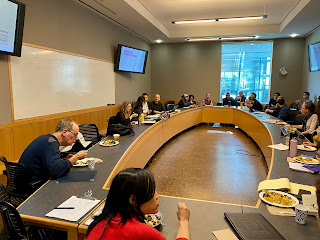On Monday hundreds of Facebook employees, in rare public criticism of their own company, protested executives’ decision not to do anything about inflammatory posts that President Trump had placed on the giant social media platform over the past week... This news shows that nowadays employees want more and more to take part in the decision of their company. Isabelle Ferreras (see the last post of Gery) has recently proposed with her colleagues around the world a manifesto called "Work: Democratize, Decomodify, Remediate". She states that working humans are so much more than "resources" and that firms must be democratized.
How? By involving employees in a decision relating to their lives and futures in the workplace.
Why? Simply because without employee no chances of success for the employer as they are the core constituency of the firm. But today, employees are mostly excluded from participating in the government of their workplaces - a right monopolized by capital investors. Practically, we would have 2 co-deciding assemblies one for the investors in capital and one for the investors in time.
The idea behind that concept is that if we leave all the power decision in the hand of the capital, it will be driven by the profit maximization which is an intolerable yardstick when it comes to our life on this planet. To me, it is always the same question: do we leave the market to regulate our problems (bottom-up) or do we expect the politics to impose regulations (top-down) to solve those problems?
I had the chance to meet Isabelle at UC Berkeley when she came to expose her idea. The biggest surprise for me what the Buurtzorg model in the Netherlands.

My goal is not to explain the model but just to tell that new concepts are possible, alive and work perfectly well. This is a model of self-management where peoples have a great life balance and are truly happy. Already today, certain socially-minded or cooperatively run business- pursuing hybrid goals that take financial, social, an d environmental considerations into account have already shown the potential of such positive impact.
This is a chance for the planet.
Thanks to research from the University of Cambridge Department of Engineering, we know that "achievable design changes" could reduce global energy consumption by 73% (Cullen, Allwood, and Borgstein, Envir. Sci. & Tech. 2011 45,1711-1718).
Let's go for it !

Comments
Post a Comment